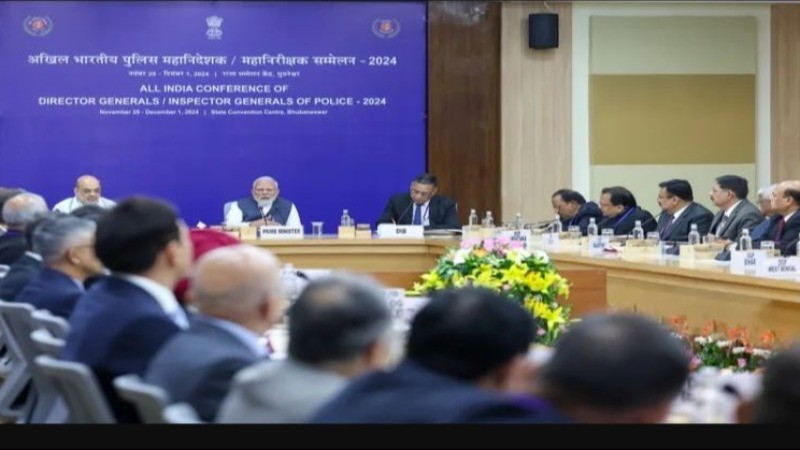
Prime Minister Narendra Modi, addressing the concluding session of the 59th All India Conference of Director Generals/Inspector Generals of Police in Bhubaneswar, raised concerns about emerging threats from digital fraud, cybercrimes, and artificial intelligence (AI). He highlighted the potential of technologies like deepfakes to disrupt social and familial relations and urged the police leadership to transform these challenges into opportunities by leveraging artificial intelligence and India’s aspirational capabilities.
Key Discussions and Deliberations
The three-day conference delved into a range of security challenges, including counter-terrorism, cybercrime, coastal security, narco-trafficking, and economic security. Border concerns with Bangladesh and Myanmar, urban policing trends, and countering malicious narratives were also extensively discussed.
Modi emphasized the importance of adopting technology to reduce police workloads and making police stations the focal point for resource allocation. He also called for the collation and implementation of successful urban policing initiatives in 100 cities across India.
The Prime Minister reiterated the need for "SMART policing," first introduced in 2014, which envisions the police as Strict and Sensitive, Modern and Mobile, Alert and Accountable, Reliable and Responsive, Tech-savvy and Trained. He expanded the acronym to include Strategic, Meticulous, Adaptable, Reliable, and Transparent approaches.
Technological Integration and Policy Updates
Highlighting the success of hackathons in addressing complex problems, Modi proposed organizing a national police hackathon to foster innovation. He also stressed the need to bolster port security and develop a forward-looking action plan in this area.
A review of new criminal laws, best policing practices, and neighborhood security concerns formed part of the agenda. The Prime Minister urged the police to modernize and align with the vision of a developed India, or Viksit Bharat.
Enhancing Unity and Professionalism
Recalling Sardar Vallabhbhai Patel’s contributions, Modi called on the police to honor Patel’s legacy by resolving to enhance professionalism, capabilities, and public image by his 150th birth anniversary in 2025.
Since 2014, the conference format has evolved significantly, moving from a Delhi-centric event to being held in various locations across India, fostering unity and camaraderie among officers. This year’s conference saw over 250 senior officers attending in person, with over 750 joining virtually.
Discussions resulted in actionable recommendations addressing both national security and core policing challenges, such as crime prevention, community policing, and law enforcement. These recommendations undergo rigorous follow-up and are reviewed during subsequent conferences.
Key decisions from past conferences have already led to policy reforms and improved policing standards in rural and urban areas. The Intelligence Bureau, in collaboration with state nodal officers, continues to track and implement these recommendations to enhance policing efficiency nationwide.
Centre Approves Rs 3,296 Crore Investment to Boost Tourism Infrastructure Across 23 States
Masayoshi Son Meets PM Modi, Focuses on Strengthening SoftBank’s India Connections
PM Modi Slams Opposition for Disrupting Parliament, Calls for Productive Discussions